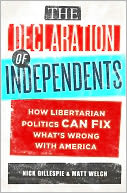ToddSeavey.com Book Selection: Declaration of Independents: How Libertarian Politics Can Fix What’s Wrong with America by Nick Gillespie and Matt Welch
Despite the fact that freedom and prosperity are found mainly in places with less government, not more – as succinctly explained in this two and a half-minute video from EconomicFreedom.org – people often look to government and politics to express their visions of how life and the world should work.
The temptation for any intellectual – including me – is to leap into the political arena and duke it out with opponents, but in this book, my libertarian colleagues Nick Gillespie and Matt Welch chronicle how more and more people are quietly opting out of affiliation with either the Republicans or Democrats (and the associated social-conservative and left-liberal ideologies) to register as independents and to form coalitions and ad hoc interest groups and – best of all – completely non-political fixations, philosophies, personal identities, and subcultures.
Let the deranged sadomasochists of all parties fight it out in DC while the rest of us get on with living, in myriad novel and enriching ways.
Of course, we will still need people willing to play defense and fight the political battles that keep government off our backs. It was a bit sad this week to hear Ron Paul won’t seek reelection to Congress but nice to see his presidential campaign attract a bit of extra attention – and nice to see him taking on Fed Chairman Ben Bernanke like never before. It’s a welcome alternative to the shifty but ever-arrogant pontificating of statists like Paul Krugman, whose self-contradiction was so ably skewered by Mickey Kaus this week.
Nick did an hour-long interview about the new book on C-SPAN (not C-SPAN2), and Bretigne Shaffer’s reaction to it – and to home brewing – leads Reason’s round-up of reactions to the book (her full review is here, second review down).
Sidenote: I like American Conservative, but I can’t help sort of enjoying how wrong – and stereotypically so, for paleocons – that magazine manages to sound in its reaction, excerpted in that Reason round-up, to the book. That reaction – that societies naturally crave order rather than liberty – is a more than sufficient, one-paragraph summary of the whole paleocon worldview, really (a commenter on the original AmCon page, I noticed, uses the
likely-apt handle Grumpy Old Man and says, disturbingly, “Above all, the masses crave strength. What is remarkable is how none of our leaders seem to want to give it to them”). But may they constrain and bind and un-liberate themselves to their hearts’ content, so long as they don’t drag down the rest of us innocent bystanders. (The reaction of PJTV’s Alonzo, also linked in Reason’s round-up, may, alas, be the more conventional one: Keep these hippie drug-using libertarians away from my neighborhood, basically.)
It will likely come as no surprise that I loved Declaration of Independents – and admittedly I know or have met several people mentioned above including the authors – but let the record show that I don’t love just everything that libertarians spew out. This book, like a 240-page version of a wiseass Gillespie aside, is downright exhilarating in its contempt for the usual two factions in what it terms our stagnant and likely-doomed political “duopoly.” It gives one hope that sheer stupidity does eventually bring collapse and renewal. If so, the stupid, one-size-fits-all behemoth called government is plainly overdue for implosion. Perhaps the current debt crisis will be the long-awaited moment.
If not, though, the book gives one hope that we will find ever-multiplying ways to route our lives around the sinkhole that is politics and find happiness. It even gives me hope that people less ideologically inclined to agree with all this might find the book persuasive. I look forward to hearing reactions from non-libertarians, but first they should read it, in large numbers.
It was thirteen years ago (though it feels like yesterday) that a previous Reason editor, Virginia Postrel, suggested ditching the right-left spectrum in favor of a dynamism-stasis spectrum (in her book The Future and Its Enemies), and her editorial successors, Gillespie and Welch, have taken things up a notch here, saying in effect, “Who needs political spectrums at all? Go do your own thing.”
Let’s do that, and if it confuses the usual commentators, politicians, pollsters, and academic analysts, so much the better.


No comments:
Post a Comment